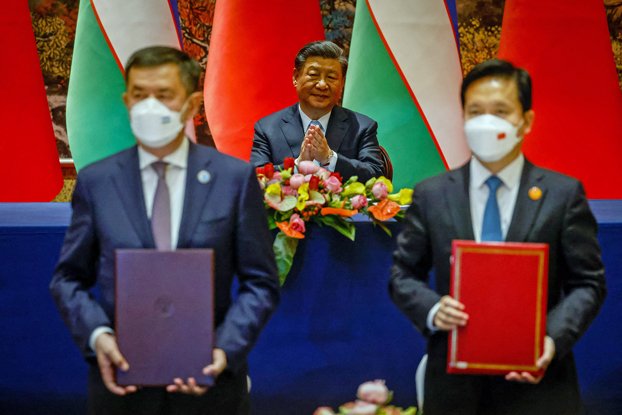
China’s President Xi Jinping rolled out the red carpet for Central Asian leaders attending the first China-Central Asia Summit, held Thursday and Friday in Xian, as Beijing seeks to expand its influence in the region through trade, investment and diplomatic engagement.
The leaders from Kazakhstan, Uzbekistan, Tajikistan, Kyrgyzstan and Turkmenistan are also keen to engage with China.
But rights groups say the leaders have seemingly turned blind eye to China’s repression of the Uyghurs – as well as Kazakhs, Kyrgyz, Uzbek and Tajiks – living in the northwest Xinjiang region, despite sharing similar religious and cultural values.
The region is home to more than 11 million predominantly Muslim Uyghurs and other Turkic minorities who have been repressed by the Chinese government in recent years through detention in “re-education” camps, torture and forced labor.
On the eve of the summit, the Germany-based World Uyghur Congress, or WUC, said the governments of the five nations had a responsibility to speak up on the rights abuses.
“Central Asian governments have followed suit on the brutal treatment and intimidation the Chinese government displays against Uyghurs and other Turkic people,” WUC President Dolkun Isa said in a statement.
“These neighboring countries have failed to live up to their commitments and to save Uyghurs, Kazakhs, Uzbek, Kyrgyz and Tajiks from the ongoing genocide being committed against them,” he said.
The WUC said it strongly condemned the prioritizing of economic and trade relations to serve Chinese expansionism and influence in Central Asia over curtailing the ongoing genocide of Uyghurs and other Turkic peoples.
‘Sanitizing China’s image’
The mostly Muslim Xinjiang region has ethnic, religious and business ties to Central Asia, making it ideal for Beijing’s outreach to nations seen as necessary for increasing trade, ensuring energy security, and maintaining stability in Xinjiang.
Central Asia has become so critical for China that Ma Xingrui, the Communist Party secretary for Xinjiang, met with top leaders from Kazakhstan, Uzbekistan and Kyrgyzstan in March.
But the Central Asian governments have failed to uphold their commitment to human rights by condoning China’s genocidal policies against Uyghurs and Turkic people, and by opposing a resolution about a debate on the situation, WUC said.
Ilshat Hassan Kokbore, a political analyst based in the United States and vice chairman of WUC’s executive committee, said China strengthening its relations with the Central Asian countries, to do its bidding in international fora with regard to the ongoing Uyghur genocide.
This includes “sanitizing China’s image, providing diplomatic cover for the atrocities or promoting China’s narrative that there is no genocide,” he said.
Xinjiang “re-education” camp survivor Gulbahar Jelilova, a Uyghur businesswoman from Kazakhstan who had been involved in cross-border trade for 20 years until 2017, said that no Kazakh official or minister asked her about her ordeal or the reason for her detention.
“I was so disheartened by them that I left Kazakhstan and moved to Turkey,” said Jelilova, who was detained on accusations of “aiding terrorism” while on a business trip to Xinjiang and put into three different camps over a period of 15 months beginning in May 2017.
Jelilova said she opposed a new visa regime which allows Chinese tourists a 30-day entry into Kazakhstan because many will go there but never leave after their visas expire, and will not allow Uyghurs from Kazakhstan or Kyrgyzstan to visit their homelands.
Translated by RFA Uyghur. Edited by Roseanne Gerin and Malcolm Foster.
